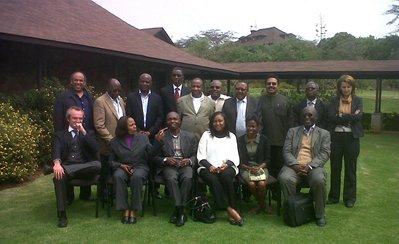A meeting of the Regional Coordination Mechanism for Africa (RCM-Africa) clusters was held in Nairobi, Kenya, 24 - 25 July to review the African Union Commission's 2012 Work Plan to date.
 UNCTAD representative Mr. Taffere Tesfachew, Director of the Africa and LDC attending RCM-Africa UNCTAD representative Mr. Taffere Tesfachew, Director of the Africa and LDC attending RCM-Africa |
After conducting a needs assessment exercise, the African Union Commission developed a ten year capacity building work programme, which was discussed at the twelfth session of RCM-Africa held in Addis Ababa in November 21-22 November 2011.
The commission has identified 9 priority areas, which are coordinated through a cluster mechanism, each cluster involving a number of UN agencies with the relevant expertise and mandates.
The priority areas under each cluster include: infrastructure development; governance; environment, population and urbanization; social and human development; agriculture, food security and rural development; science and technology; advocacy and communications; peace and security; and industry, trade and market access.
UNCTAD is a member of four clusters namely, infrastructure and development; governance; science and technology; and industry, trade and market access.
This week, UNCTAD representative Mr. Taffere Tesfachew, Director of the Africa and Least Developed Countries Division, presented the 2012 UNCTAD Economic Development in Africa report, which addresses the issue of structural transformation and sustainable development to the cluster dealing with "Environment, Population and Urbanization".
UNCTAD also briefed cluster members about its activities to promote organic agriculture in Africa - jointly with UNEP, FAO and the African Union and it's perspectives on the Rio+20 outcome and the implications for Africa.
UNCTAD highlighted that climate change is a development issue because it will have significant impacts on countries' capacity for economic growth, poverty alleviation and the achievement of MDGs.
As frequently highlighted by the Secretary- General of the United Nations, Mr. Ban Ki-moon, climate change is the "defining challenge of our times". The cross cutting nature of climate change makes coordination by UN agencies operating at the country level and non-resident agencies essential in order to provide collective responses in support of national priorities.


